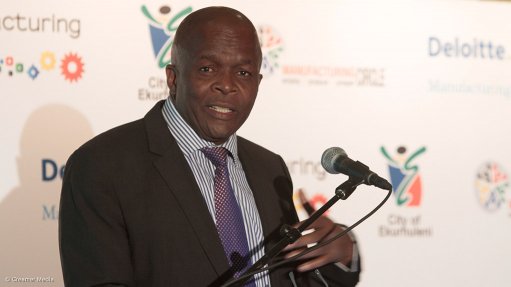
Ekurhuleni executive mayor Mondli Gungubele
Photo by: Duane Daws
Ekurhuleni executive mayor Mondli Gungubele has outlined the main elements of the Gauteng city’s manufacturing revitalisation strategy, which he says could facilitate R19-billion-worth of industrial investments into the metropolitan area over the coming few years.
In a keynote address to the inaugural Manufacturing Indaba, which is taking place in Ekurhuleni, Gungubele reported that R3.9-billion worth of industrial investment had already been facilitated, much of it aligned to its airport city, or aerotropolis, strategy – the metropolitan area is home to the OR Tambo International Airport.
The city was set to accommodate the manufacturing facility that would be built by the Gibela consortium, which was recently awarded a R51-billion contract to supply the Passenger Rail Agency of South Africa with 600 commuter trains over the coming ten years. It has been reported that Gibela plans to build a R1-billion factory in Dunnottar, 10 km north of the town of Nigel, to produce the 580 trains that will be made locally.
The mayor also revealed that it had entered into a memorandum of understanding with Transnet and the Gauteng provincial government for the creation of the country’s largest inland port, around which the city would seek to crowd-in manufacturing investment.
Consulting firm KPMG had also been appointed to draft a five-year ‘industrial development policy, strategy and programme’, which would inform the “orderly re-industrialisation” of the region.
The plan was premised on restoring the once dominant role of manufacturing to Gauteng’s East Rand – a role that the services sector had usurped, becoming the major contributor to the R200-billion-a-year regional economy.
As part of the strategy, the council was assessing the release of 147 parcels of land, following an analysis showing that a lack of access to ‘strategic and developable land’ was a key impediment to investment.
The re-industrialisation plan, which is also integral to Ekurhuleni’s Growth and Development Strategy 2055, would be built on 13 pillars, which included improved support for and responsiveness to manufacturing enterprises, a greater focus on green-economy prospects and upgraded infrastructure networks.
The Ekurhuleni Business Facilitation Network had also recently been launched in partnership with Emperors Palace to provide a one-stop shop for investment and development applications. It also houses the city’s Aerotropolis project office.